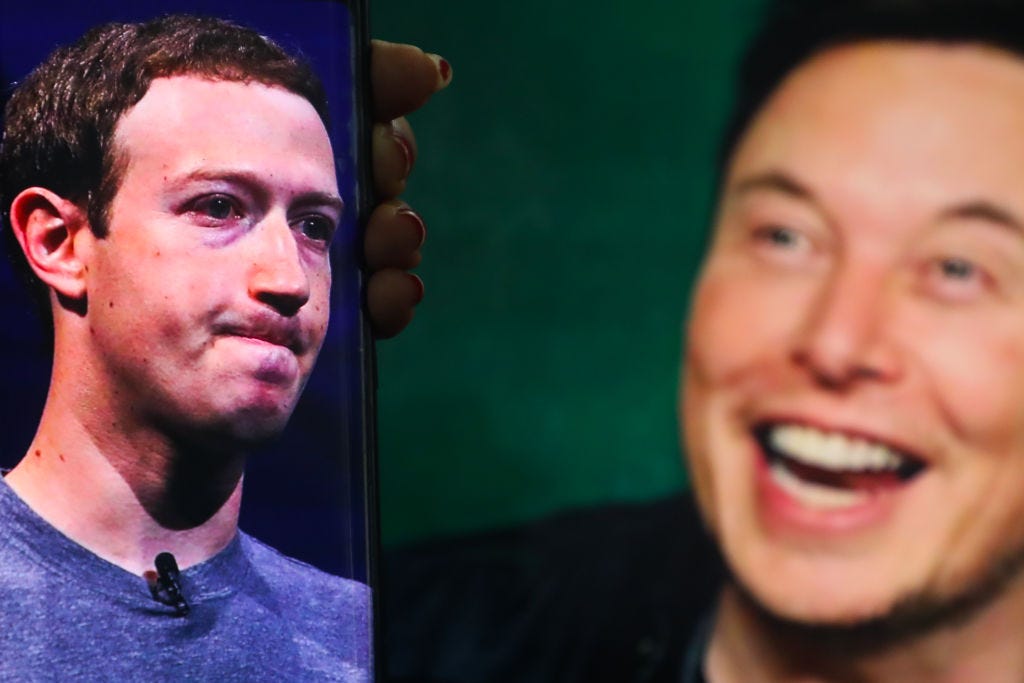What the Zuck? How Meta Has Enabled Elon Musk's Toxic Election Influence
Threads had the opportunity to topple Twitter, but Zuckerberg's decision to sidestep politics undermined its potential.
For approximately five seconds last year, the impossible seemed possible. Mark Zuckerberg was likable. Liberals like myself had come around to supporting the Cambridge Analytica enabler as the potential answer to the perpetual victim and right-wing extremist Elon Musk inserting himself into our domestic politics. Zuckerberg was set to literally pummel Musk in a “cage match,” but more importantly Zuckerberg’s Meta had launched a promising competitor to Musk’s poisonous iteration of Twitter, the so-called “digital public square.” The billionaire Harvard dropout had even buffed up and gotten a notable style makeover. A year later, however, it’s clear that far from taking on Musk – Zuckerberg has capitulated to his cynical anti-democracy agenda and even enabled the Tesla leader’s 2024 election manipulation efforts.
This week, Zuckerberg capped off a month of groveling to MAGA politicians. While some might forgive his casual normalization of right-wing white Christian nationalism as he praised Donald Trump as “badass” after a Republican tried to shoot him – Zuckerberg has taken serious steps to endear himself to Republicans. Though just last month, Trump threatened to jail Zuckerberg for “election fraud,” the 5’7” recreational MMA fighter has seemingly rolled over.
On Tuesday, he sent a letter to the incredibly unserious Rep. Jim Jordan of Ohio validating inaccurate GOP talking points about the Biden White House’s efforts to curb lethal COVID disinformation. He and his wife will also no longer donate funds to protect election integrity and expand voter access. “I know that some people believe this work benefited one party over the other…My goal is to be neutral and not play a role one way or another – or to even appear to be playing a role. So I don’t plan on making a similar contribution this cycle,” Zuckerberg wrote in the letter. (What a standup guy…staying neutral on whether a fascistic, convicted criminal, and adjudicated rapist should lead the nation.)
Obvious pandering aside, despite high-profile tension with Musk over the past few years, Meta has actually played a critical role in protecting the father of 12's toxic influence on our social and political discourse during this critical election cycle. While Musk’s efforts to weaponize Twitter this election cycle were incredibly predictable, the absence of a suitable alternative is, in large part, Meta’s fault.
Meta Makes Its Move
Musk’s takeover of Twitter in late 2022, sent shockwaves through the digital landscape. As Twitter descended into chaos, a number of alternative platforms emerged, each vying to capture the user base fleeing Musk’s “X.” Mastodon offered a decentralized approach, while BlueSky, backed by Twitter co-founder Jack Dorsey, tried to replicate Twitter’s functionality with a more ethical backbone. Despite good intentions, these platforms struggled with scalability, network effects, and user adoption. Moreover, a slow trickle of users leaving the site would not provide the critical mass or viral web necessary for a viable breaking news social media platform.
Then, in July of 2023, an opportunity arose. Musk had finally gone too far. Tweet accessibility became limited, Musk floated a plan to charge all users for the site, and a cap on tweets had been implemented. Advertisers had started to flee the site, and “delete Twitter” became a viral movement and trend over that month. While sites like Mastodon, Post, and others were slowly building audiences – and it looked like this might finally be their moment to capture the millions of users needed to compete with Twitter – Meta decided to make a major move.




